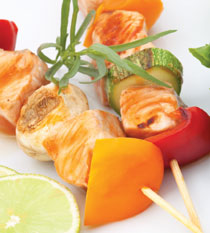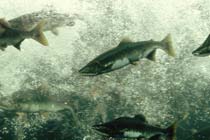Healthy and sustainable seafood

From wild Alaskan sockeye to succulent Oregon albacore, the abundance and variety of Pacific Northwest seafood is unmatched anywhere in the world.
At PCC, we work closely with local suppliers to ensure our seafood is the highest quality and healthy for you and the environment. We partner with the Monterey Bay Aquarium’s Seafood Watch program to ensure we source only from well-managed, sustainable fisheries — and we don’t carry varieties with unsafe levels of PCBs, mercury or other contaminants.
A healthy catch
Low in saturated fat, high in protein, and full of nutrients, seafood can be an important part of a healthy diet.
Many varieties are rich in omega-3 fatty acids, which research indicates may help reduce the risk of heart disease and inflammatory conditions. Omega-3s also support brain function and may even improve your mood!
Fish are a source of many trace minerals essential to good health including zinc, iron, copper, potassium, phosphorus, iodine and selenium. Small fish, such as sardines, are especially rich sources of calcium. Seafood also is a source of several vitamins, including B-6 and B-12, which help maintain healthy blood cells.
The American Heart Association recommends eating two servings of fish per week to help reduce the risk of coronary heart disease.
It’s in the can
Canned and frozen seafood provides the same nutritional benefits as fresh but is less expensive, available year-round, and can be stored for quick, easy meals.
Research shows frozen fish may have a smaller carbon footprint than fresh because it can be transported by freighter or train, which use less fossil fuel than planes.
PCC’s premier tuna
You’ll find unsustainable tuna in other grocery stores — but not PCC.
We carry albacore individually caught in Pacific Northwest waters — one of the most healthy, sustainable and delicious seafoods you can eat.
It’s meaty and rich, not fishy or metallic-tasting like mass-market tuna. It tops the Seafood Watch program’s Super Green List, meaning it’s a “Best Choice” for sustainability, rich in omega-3s, and has low levels of contaminants. Find it in glass jars or BPA-free cans. We also have “steaks” in our frozen seafood section, perfect for the grill or a quick sear in the pan.
PCC #1 for sustainability
PCC is the top retailer in the United States for sustainable seafood policies and initiatives according to a report by Greenpeace USA. We received a higher rating than any other grocer in the nation!
What makes our seafood sustainable?
Get cooking
Try this recipe for Pasta con Le Sarde.
All our fresh, canned, jarred and frozen seafood comply with Seafood Watch guidelines. This means it’s caught or harvested in environ-mentally friendly ways that avoid habitat destruction and wasteful “bycatch” — and that stocks are strong, not threatened by overfishing.
We carry some farmed seafood that’s sustainable, according to Seafood Watch standards — including filter-feeding species such as mussels, clams and oysters, as well as some shrimp, trout, tilapia and catfish.
What about mercury and PCBs?
The smaller the fish, the lower it is on the food chain with fewer accumulated toxins. Sardines and anchovies, for instance, are among the “cleanest” of sustainable choices, and a rich source of omega-3s.
PCC does not carry seafood with high levels of PCBs or mercury. Traces of these contaminants are in many seafood species, however, so some should be eaten only once in a while. The Seafood Watch pocket guide indicates the varieties to limit.
Mercury is a toxic metal and often is concentrated in the flesh of large fish at the top of the food chain, such as mackerel, swordfish, large tuna, and shark.
Polychlorinated biphenyls (PCBs) are industrial chemicals that settle in the bottoms
of rivers and oceans and are stored in the flesh of some fish.
Seafood Watch
Pocket guides to help you choose sustainable seafood are available at all PCC seafood counters, or online at seafoodwatch.org.

Why is wild salmon better than farmed?
Farmed salmon pollutes the environment and has 16 times more PCBs than wild salmon. PCC does not sell farmed salmon.
